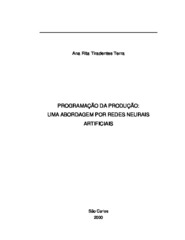Programação da produção : uma abordagem por redes neurais artificiais.
Abstract
Production scheduling finds in the most detailed and complex level of
production planning and control systems. Due to its nature combinatorial,
several methods have been proposed to solve it. Among them there are the
techniques of simulation systems and artificial intelligence approaches. This
work presents a procedure of solution of production scheduling, through a
hybrid model of simulation systems and artificial neural networks. In this
procedure, the purpose of the artificial neural network is to learn the
relationships between the priority rules designated to the machines of a
production system, and the values of performance measures used to
evaluate the scheduling. The objective is to analyze the differentiation among
a group of combinations of priority rules through the evaluation of four
performance measures. Results are presented and commented, highlighting
the capacity of generalization of the hybrid model in prescribing priority rules
to the machines, based on values of performance measures established by
the user.
